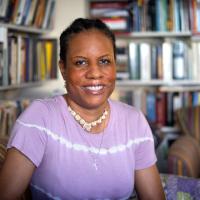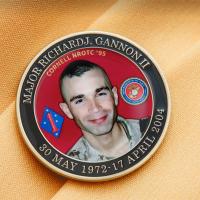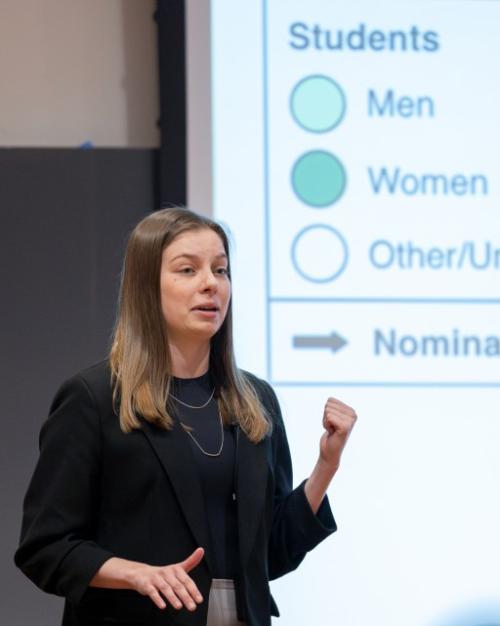“I want you to remember a time when you were in a setting where you felt like you didn’t belong. I want you to remember how you felt in that setting, maybe isolated or out of place, and how much you felt like you wanted to continue going back to that setting—probably not much. These feelings are all too familiar for undergraduate women pursuing their studies in science, and in physics specifically,” began Meagan Sundstrom, a doctoral candidate in physics at the ninth annual Cornell University Three Minute Thesis (3MT) competition.
Alongside seven other finalists, Sundstrom presented her dissertation research in just three minutes on March 20 to a panel of judges and an audience from across campus while additional friends, family, advisors, and lab mates watched online. In the first in-person Cornell 3MT since 2019, presentations were judged by how clearly and compellingly students summarized their research to a general audience, using only one static slide.
Sundstrom’s presentation, “Recognizing and Removing Barriers for Women in Physics,” earned her first place and $1,500. Second place and $1,000 was awarded to information science doctoral student Sterling Williams-Ceci for her presentation, “AI Helps us Write – but at What Cost?”
After nearly 60 in-person and 70 virtual audience members cast their ballots, votes were tallied and the People’s Choice Award and $250 were presented to biomedical and biological sciences doctoral candidate Sharada Gopal for her presentation, “Worming Our Way to a Longer Life.”
This year’s judges included Jane Bunker, director of Cornell University Press; Joe Ellis, director of online degree program development at eCornell; David Lodge, the Francis J. DiSalvo Director of the Cornell Atkinson Center for Sustainability; and Bob Riter, patient advocate for the Cornell Community Cancer Partnership. Organization of the competition and coaching of presenters was provided by the Graduate School Office of Career and Professional Development.
“As grad students, there are a lot of opportunities to give your elevator pitch at conferences and more professional settings to more senior people in your field, and I thought this would be a really cool opportunity for me to try to tailor that pitch to a more general audience—how would I describe my research to my family and friends?—so that was fun,” said Sundstrom.
Being able to “zoom out” and view her topic from a different perspective was also helpful for Sundstrom, who is currently writing her dissertation and appreciates having both formulated a storyline and thought about the broader impacts of her work.
Williams-Ceci similarly enjoyed the chance to speak to a different type of audience than she is used to addressing.
“I hadn’t really had an opportunity in grad school to try communicating to a broad audience, it’s always just to my lab, so I wanted to practice having a chance to really tell a story and not just go through the slides,” she said. “It really helped me know for a fact that I can tell a convincing story about a project that I’ve done.”
Gopal shared that the 3MT was a fun way to combine her longtime artistic interests with her science.
“It seemed like such a fun event. I did a lot of theatre in college so I thought, ‘What can I do artistically here?’ and this seemed like a good mix of my scientific interest and my artistic theatre interests,” she said, adding that she also benefitted from looking at the bigger picture of her work and its impacts.
The 3MT competition was first held in 2008 at the University of Queensland and has since been adopted by over 900 universities in over 85 countries. 3MT challenges research degree students to present a compelling story on their dissertation or thesis and its significance in just three minutes, in language appropriate to a non-specialist audience.
Cornell’s Graduate School first hosted a 3MT competition in 2015 and the event has grown steadily since that time. As the winner of Cornell’s competition, Sundstrom will now go on to compete in northeast regional competitions.
“Our Three Minute Thesis final round is a highlight of the year for those of us in the Graduate School—literally we talk about it all year long,” said Kathryn J. Boor, dean of the Graduate School and vice provost for graduate education. “We look forward to it because it’s just plain fun, and it’s an opportunity for us to watch and learn from our accomplished and creative graduate researchers.”
“I could not possibly be more proud of the work we saw,” she said.
Read the story on the Cornell University Graduate School website.




